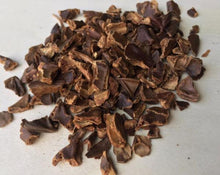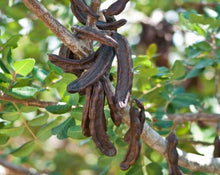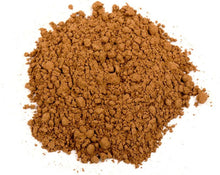Promote mental health with Carob Tea!
Carob Tea - Ceratoniasiliqua L.
Origin: Spain
Used part: Fruit
Description:
The carob, scientific name Ceratonia siliqua L., is an edible pod, like beans, also popularly known as carob, algarrobo, algarobia and mesquite gum. It is native to the Mediterranean coast, dark brown in color and has a sweet taste. This medicinal plant has a pulp that can be roasted and ground, turning into a powder that is usually used by the food industry as a substitute for cocoa. Although it is used in this way, the powder obtained from the pulp of the roasted and ground pod presents a considerable difference in relation to cocoa, as regards the amounts of fat and sugar. The carob has 0.7% fat and a high content (about 38-45%) of natural sugars, such as sucrose, fructose and glucose; while cocoa contains up to 23% fat and 5% sugar.
It has about 40 calories in each spoon (soup) and has no fats, gluten or proteins among its properties. Thanks to these peculiarities, the carob, besides having a cocoa-like flavor, kills the desire for it without causing the damages that ordinary chocolate causes.
Health benefits:
Carob is a medicinal plant that contains several phenolic antioxidant compounds, such as gallic acid, quercetin, flavonoids, myricetin, tannins, among others. Among its nutritional properties, we find vitamin A, B vitamins and minerals such as calcium, iron, magnesium and potassium. In addition, this plant is rich in soluble and insoluble fibers (4 to 6%). Due to its components, the carob has a laxative, astringent, satiating, glycemic and aphrodisiac action.
Due to its properties, the carob is also called "healthy chocolate", being used in several industrial processes, especially the pharmaceutical, food and cosmetics. The B vitamins, present in the plant, contribute to the proper functioning of the nervous system, muscles, heart and mental activities; for the growth of bones and teeth; good vision health and vitality of the skin. Carob also helps reduce LDL ("bad cholesterol") and triglycerides. Another of its benefits is to assist in inhibiting the proliferation and viability of cancer cells. Because of its properties, this plant is indicated to aid in the treatment of constipation, hyperglycemia, diabetes, vomiting, diarrhea and hypoglycemia.
Good Herbal Remedy:
- Reduce glycemic level
- Maintenance of cholesterol
- Cease vomiting and cravings
- Combat indigestion and heartburn
- Natural laxative
- Fight aging
- Combat reflux
Directions:
1. Combine carob pods and water in a pot. Bring it to boil
2. Let it simmer over medium low heat for about 30 minutes
3. Serve it either cold or hot
How to drink:
Take 2 to 3 cups a day.
Contraindications:
Carob is likely safe for most people when taken by mouth in food amounts or as a medicine. There don’t seem to be any unwanted side effects. There is not enough reliable information about the safety of taking carob if you are pregnant or breast-feeding. Stay on the safe side and avoid use in greater than food amounts.






